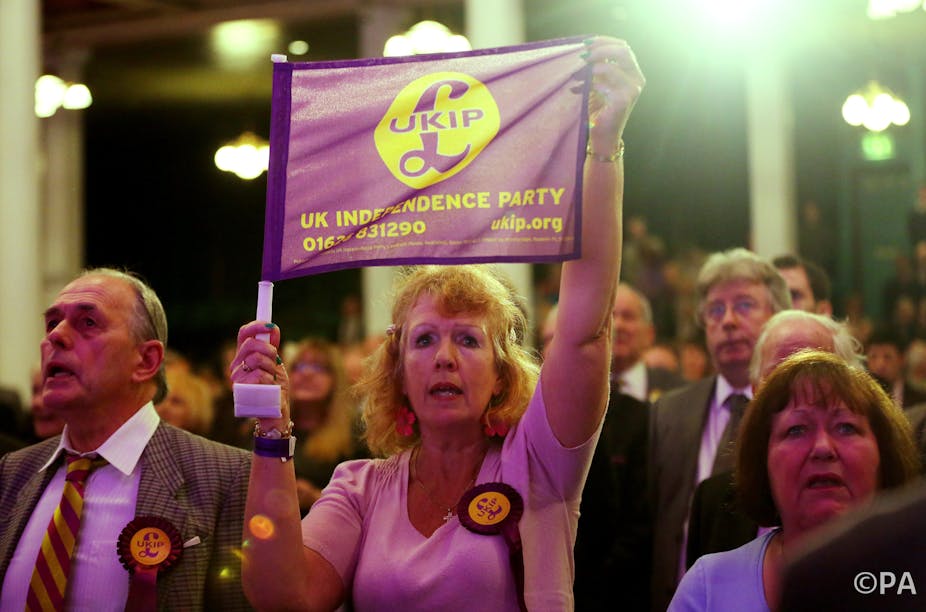The result of the EU referendum could be considered the ultimate victory for Nigel Farage and his party. UKIP was founded as a single-issue political party – its sole aim being to leave the European Union.
Yet, to the surprise of many, Farage has resigned as UKIP leader – and this time, for good. Even though he said he’d like to play a role in Brexit negotiations, the British government is highly unlikely to have such a farewell gift in mind for him.
His decision will spark a leadership contest but it also provides an opportunity for UKIP to rethink its priorities now that its primary goal has been achieved. It can capitalise on the gains made under Farage but it needs to combine that success with a greater sense of unity – which never seemed possible during his tenure.
A star on the rise
Over the past two decades, UKIP has gained considerable influence in the European Parliament. It is now the largest British party represented in Strasbourg following a stunning victory in the 2014 European elections – although one could argue that the biggest winner in that particular vote was abstention.
UKIP’s influence in shaping the British government’s European agenda cannot be ignored. It wasn’t part of the official Vote Leave campaign but it inspired many of the policies on which the campaign was based. The idea of introducing an Australian points-based system to lower net migration originally came out of UKIP, for example.
Farage’s departure does not mean UKIP will disappear. It is polling as the third largest political force post-Brexit with 15% of voting intentions.
But whether the party can sustain this all depends on if it can re-brand itself after Brexit. It will need a strong, charismatic leader who has clear views on what the party should do, and who can generate media attention. Douglas Carswell, the party’s sole MP, has already implied that he will not stand, although he believes the party should not become an “angry and nativist” movement.
The other bookmakers’ favourites are MEPs Paul Nuttall, the current deputy leader, and Steven Woolfe, the party’s migration spokesman. Suzanne Evans, the former deputy leader, has also declared her interest, but is currently suspended from the party for disloyalty.
Three scenarios seem imaginable, and it mostly depends on the kind of new relationship negotiated between the UK and the EU.
1. Rebrand
This is probably the most likely scenario, since it was envisaged way before the referendum. In this possible future, UKIP is made over to become the English nationalist UKIP (or EIP).
Even back during the 2014 Scottish independence referendum campaign, there were clear indications that Farage backed the creation of a devolved English parliament. He claimed there is no reason why England should not have devolved powers like Scotland or Wales. While UKIP’s recent success in the Welsh elections could be an obstacle to this alternative, the party might also campaign for transforming the UK into a real federal state, with increased devolution for everyone.
2. Status quo
If the UK negotiates a deal with the EU that continues to allow EU migration, very many Leave voters will feel betrayed. Immigration was a key factor in the Leave victory and it would be surprising if the UK didn’t seek a deal that would limit free movement to some extent – at least temporarily.

But if the deal is judged unsatisfactory, UKIP could then make significant electoral gains in its current form. It could argue that the UK has not really left the EU if immigration continues to be allowed, and continue to campaign on the immigration issue.
3. Disintegration
Whoever becomes the new UKIP leader will have some big shoes to fill. Farage’s populism and charisma were central to the party’s surge. Whoever replaces him will have to keep the momentum going. But they will have to do a much better job at uniting the party than Farage ever could.
If the new leader fails to bring the party together behind a solid and consensual political agenda, some members might defect. Before Farage’s resignation, one of UKIP’s key donors, Arron Banks, hinted that he would create a brand new political party capitalising on the Leave momentum. He also claimed that “Ukip needs to be reformed root and branch”. This move was rather surprising, and Farage’s decision to resign could have been linked to Banks’ interview. Perhaps now that Farage has resigned, Banks will give up his plans to found a new party.
UKIP now finds itself in a similar position to Labour and the Conservatives. Despite having set itself up as a million miles from the mainstream parties, it now faces the same, crucial existential challenges in the wake of Brexit. These will need to be addressed sooner rather than later.

